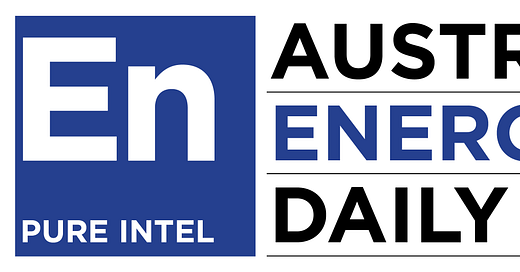Day 33: 'Consumer-minded culture'
An introductory weekday newsletter from Schwartz Media. Counting the days since Australia had an energy policy.

Good morning and welcome to day 33.
Today in summary: Regulator ASIC said most of Australia’s listed companies weren’t providing meaningful information to shareholders on climate risk; Australian energy companies large and small have signed on to a new “Energy Charter” seemingly to avoid more stick from the ACCC; and the federal energy department’s latest data dump (albeit for 2016-17) showed Australian energy consumption was three times production during the year, but most of our energy was exported.
— Charis
Current policy spin level: 💨
Most of Australia’s listed companies have considered climate risk, but many aren’t following through with adequate disclosures, according to a new report from regulator ASIC. Companies are legally required to disclose material business risks due to climate change, but just 17% of those ASIC surveyed did so. In most cases, the disclosures were too general and fragmented to be meaningful.
Fifteen CEOs from energy companies large and small have signed onto a new energy charter, which they say will focus on “embedding consumer-minded culture and conduct in energy businesses to create tangible improvements in price and service delivery”. The draft charter is open for comment until October 17. It comes after the ACCC said the National Energy Market was broken and needed to be reset with a raft of measures designed to reduce prices. The regulator has been tasked with monitoring and reporting on energy prices into 2020. Meanwhile, the federal government has not ruled out a royal commission into energy.
Natural gas production outweighed a fall in oil and brown coal production in 2016-17, a year where Australia’s transitioning energy sector saw energy productivity improvements. Energy consumption grew by 1.1% during the year, led largely by the mining sector, according to the federal energy department’s latest data release. Oil still leads the way in Australia’s energy mix (at 38%), followed by coal (32%) and natural gas (25%). Renewable energy sources accounted for 6%, with solar generation up by 18%. Australia continued to export the majority of the energy it produced, led by LNG exports which grew by 41% during the year.
Geopolitics
Polish President Andrzej Duda has lined up behind US President Donald Trump to warn of the threat of Russian energy dominance. President Duda’s visit to the White House saw him renew Poland’s strategic partnership with the US, including on energy security. President Duda said the threat of absolute Russian domination in Europe in gas was obvious.
“What are the results of such a domination, ladies and gentlemen? We were able to see that ourselves a couple of years ago in Ukraine. A sudden interruption of supplies. Of course, it had nothing to do with economic factors. It was connected only and exclusively with political blackmail. It was a fact.”
The Commentariat
US President Donald Trump’s oil sanctions on Iran are working, writes New York Times energy correspondent Clifford Krauss. Oil prices in the US have risen only modestly, and international oil companies are bailing out of deals with Iran. “The most important reason that predictions of higher oil prices have been wrong is that there is plenty of oil sloshing around the world. The United States has become a huge exporter of oil in the last several years and is now shipping roughly the same amount — more than two million barrels a day — that Iran did earlier this year.”
Three more things
A small agency inside the US Department of Energy is punching above its weight in the technological race for long-term energy storage. Vox Media sheds some light on why this DARPA-like agency is fighting for its survival.
ASX-listed, onshore oil producer Beach Energy is due to become Australia’s biggest oil producer by the end of the year, and will temporarily dislodge Woodside from the top spot, writes The Sydney Morning Herald’s Cole Latimer. “The fact that an onshore operator [as opposed to an offshore oil company] could be Australia’s largest oil producer was unthinkable until recently.”
Cybersecurity threats are growing for large US utilities, according to a new report from officials in the state of Connecticut. The utilities say they have been successful at thwarting millions of intrusion attempts, but it’s taking more and more time to do so. The report comes after the US Department of Homeland Security warned Russian-backed hackers could create blackouts after gaining the ability to "throw switches" on the power grid.
This is an introductory service while we’re building a comprehensive daily paid online publication, coming in early 2019.
We’re not here to take sides, simply to cut through the noise, and help you make sense of the emerging policy and market trends you need to be across. We call it pure intel. You can read more about us here.


